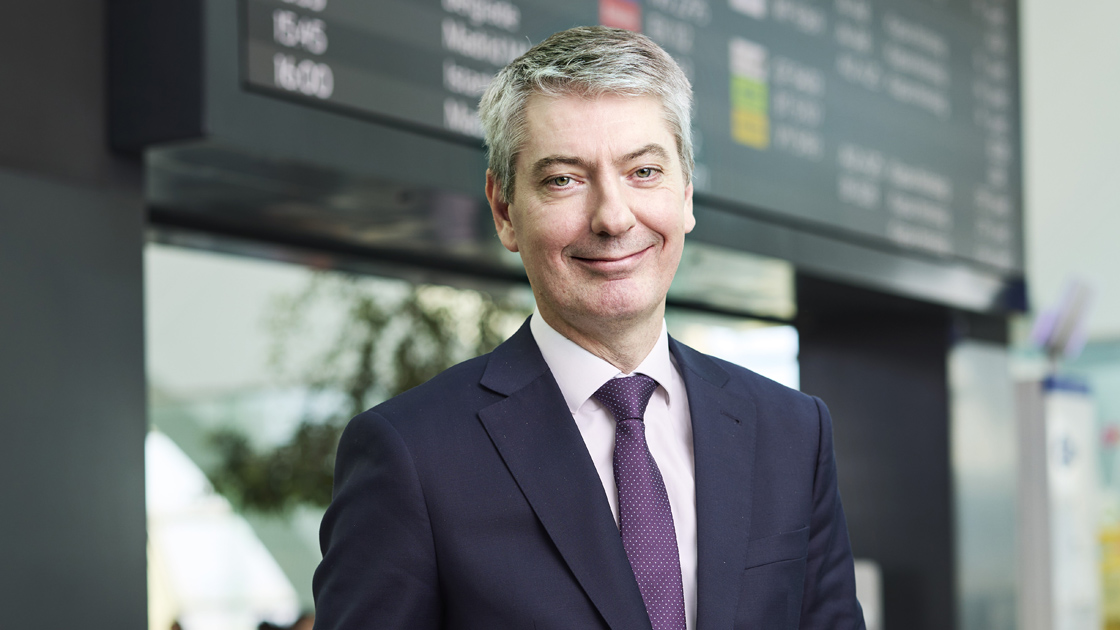On June 6, 2024, the sale and purchase agreement for Budapest Airport Ltd., the operator company of the Hungarian capital's Ferenc Liszt International Airport, was signed. The Hungarian state acquired an 80% stake, while French co-investor VINCI Airports acquired 20%. As of the same day, François Berisot was appointed as the new CEO of Budapest Airport. He has more than two decades of international aviation experience, having spent the previous five years in Belgrade as the CEO of Nikola Tesla Airport, which is also part of VINCI Airports.
The CEO now tells Diplomacy&Trade that “the teams at Budapest Airport are very professional and competent, that is what really impressed me when I joined a year ago. I was also very quickly impressed by the strong sense of community among all parties and stakeholders at the airport.”
He adds that for the past year, he has been working with all the staff at Budapest Airport, as well as with its partners, to put the airport in the best possible position to face up to the major challenges: “on the one hand, the preparation and construction of our new Terminal 3, and on the other hand, our ability to develop over the next years, before Terminal 3 can arrive, while ensuring the best possible service for our customers. From this perspective, my expectations have largely been met. We are opening a new, exciting page in the history of Budapest Airport.”
A major airport in the region
At the takeover, it was stated that "the company is on an upward trajectory, with a good chance of increasing its regional influence." After a year, the CEO continues to share this statement. “2024 was a milestone year for the airport, we served a record 17.6 million passengers, surpassing both 2023 and our previous all-time high in 2019. Passenger numbers have continued to grow strongly in 2025, with 9,071,236 passengers in the first half of the year alone – 15% more than last year.
He stresses that cargo operations are also developing extremely dynamically, to the point that this airport has now become a leading air freight hub in Central and Eastern Europe. “This growth confirms our positive outlook and regional ambitions. Ferenc Liszt International Airport was named Europe’s best airport in its category by Airports Council International, based on passengers’ experience and feedback, for the second year. Skytrax recognized us as the best airport in Eastern Europe for the twelfth consecutive year – a clear proof that we are on an upward trajectory and ready to strengthen our regional role further.
Additionally, we have a record-breaking offer for the summer schedule, with 200 flights to 136 destinations. The growing number of destinations accessible from Budapest’s main airport underscores not only the popularity of the country, but also the significance of it being a major airport in the region.”
During the peak summer period, daily traffic can reach 60,000 passengers and almost 400 flights.
“To meet this growing demand, we are continuously expanding our infrastructure. The refurbishment of the main access bridge and the pickup and drop-off area is underway, to better handle future traffic. The capacity of Terminal 2 is being increased until Terminal 3 is built; the passenger hall area is expanding, we now have 36 self-service baggage drop-off kiosks, and early baggage drop-off is available with several airlines. Security screening has also been upgraded with new body scanners and improved processes, ensuring shorter waiting times for our passengers,” the CEO notes.
Global expertise
As the world’s largest private airport operator, VINCI Airports operates more than 70 airports in 14 countries across the globe and works with more than 300 airlines worldwide. The density of this network, together with the variety of our airports, make this competence almost unique. This know-how and expertise are directly accessible to Budapest Airport, on all fronts: organization, technology, innovation, sustainable development, services, airline and route development, etc. “As I mentioned earlier, this summer, we are proud to offer more destinations than ever before, supporting both Hungarian travelers and inbound tourism. Budapest’s growing attractiveness and VINCI Airports’ global knowledge together ensure that we continue to develop as a leading airport in the region,” François Berisot points out.
Excellent global connectivity for cargo
Cargo operations at the airport are also developing extremely dynamically. The CEO highlights that “thanks to continuous infrastructure development, network expansion and global best practices, our airport has become a leading air freight hub in Central and Eastern Europe. The volume of air cargo also showed spectacular growth; the 34,994 tons of cargo handled in June was nearly 40% more than in the same period last year. This figure for the first six months thus reached 199,319 tons, representing a 50% increase compared to the period from January to June 2024. Major partners like Cargolux, Turkish Cargo and Qatar Airways Cargo ensure excellent global connectivity. Our achievements were recognized when Ferenc Liszt International Airport was named European Cargo Airport of the Year at the Payload Asia Awards in Singapore.”
Caring for the environment
The operation of the airport obviously puts a burden on the environment. As to what sort of measures Budapest Airport applies to alleviate this, François Berisot stresses that “at VINCI Airports, we believe mobility is essential to open up a region, boost its economic and social development, create opportunities and empower people, both individually and collectively. The idea of fostering and facilitating connections between regions, countries and communities is what drives us each day. At the same time, it is our responsibility to make our airports safer, more sustainable, inclusive and accessible to all.”
In line with VINCI Airports’ environmental policy, the goal is to cut direct CO₂ emissions by over 90% by 2030 and reach ACI Europe’s highest carbon accreditation level, certifying net zero carbon for direct operations and addressing indirect emissions as well. To achieve its goal, Budapest Airport pursues a coherent strategy to reduce the environmental impacts of the airport, by providing green energy, promoting e-mobility and energy-saving measures.
An important milestone was the introduction of sustainable aviation fuel (SAF). From January 2025, airlines have access to SAF at the airport through its certified subsidiary, Airport Fuel Supply Ltd.
“Our noise protection program, launched in 2022, continues to support around 4,000 neighboring properties, developed in close cooperation with local municipalities, to best meet residents’ needs. We are also very active in waste management, where our goal is to reach zero waste to landfill by 2030, in biodiversity protection, where, for instance, our aim is to completely eliminate the use of pesticide at the airport, and water management, where our ambition is to reduce water consumption as much as possible,” the CEO concludes.


Leave a Reply Cancel reply
Top 5 Articles
 Shaping a Generation of Creative and Resilient… September 10, 2025
Shaping a Generation of Creative and Resilient… September 10, 2025  For the Export Success of Hungarian Enterprises June 17, 2025
For the Export Success of Hungarian Enterprises June 17, 2025  New Page in the History of Budapest Airport October 8, 2025
New Page in the History of Budapest Airport October 8, 2025  MEPs call for EU court action after Hungary passes… April 18, 2025
MEPs call for EU court action after Hungary passes… April 18, 2025  Hungary Rejects Calls to Cease Russian Oil Imports September 26, 2025
Hungary Rejects Calls to Cease Russian Oil Imports September 26, 2025






No comment yet. Be the first!